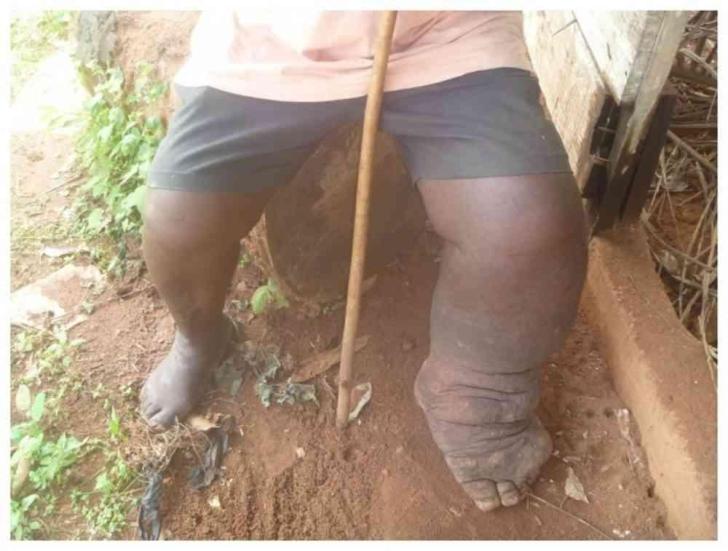News / Local
Elephantiasis outbreak hits Zimbabwe
14 Sep 2024 at 11:22hrs |
0 Views

The government has been urged to take swift action following an outbreak of elephantiasis in Mashonaland West province. Elephantiasis, a parasitic disease affecting the lymph nodes and vessels, is spread by infectious mosquitoes.
Cases have been reported in Kariba and Mhondoro Ngezi, with the outbreak initially discovered after several pupils in rural Kariba displayed symptoms. According to Kariba legislator Shine Gwangwava, tests revealed that 21 pupils were positive for the disease. The affected schools include Kalundu, Mola, and Kauzhumba primary schools, each reporting two cases, while Kasvisva, Msambakaruma, Kanyati, Negande, and Kadziro reported three cases each.
Gwangwava expressed concern over the long-term effects of the disease, noting its potential to impact multiple generations. "It has affected many people along the Zambezi Valley, where tributaries provide ideal breeding grounds for mosquitoes," he said.
In response, the Ministry of Health and Child Care has launched a 10-day mass drug administration campaign in the affected areas. Traditional leader Chief Negande, born Kausu Mpofu, urged the local communities to cooperate with the vaccination efforts. "If medical experts recommend this, we as traditional leaders support it. We encourage everyone to accept the medication," he stated.
George Kambondo, Mashonaland West's provincial health promotion officer, confirmed that the mass vaccination campaign would begin on Monday, based on research indicating a high prevalence of lymphatic filariasis in Kariba. He encouraged all affected communities to participate in the free drug administration exercise, noting that three drugs will be provided to prevent the spread of this neglected tropical disease (NTD).
Itai Rusike, executive director of the Community Working Group on Health, emphasized the need for government efforts to eliminate NTDs like lymphatic filariasis by promoting knowledge-sharing and community engagement. He called for health education campaigns and better training for community health workers to address disease outbreaks effectively.
"There must be a focus on community awareness, participation, and hygiene practices to prevent and control NTDs," Rusike said. He also highlighted the importance of distributing treated mosquito nets and strengthening indoor residual spraying programs to control the spread of the disease.
The World Health Organization (WHO) estimates that over 882 million people in 44 countries are at risk of elephantiasis, also known as lymphatic filariasis. WHO advocates for preventive chemotherapy to stop the spread, stating that since 2000, more than nine billion treatments have been administered globally.
Cases have been reported in Kariba and Mhondoro Ngezi, with the outbreak initially discovered after several pupils in rural Kariba displayed symptoms. According to Kariba legislator Shine Gwangwava, tests revealed that 21 pupils were positive for the disease. The affected schools include Kalundu, Mola, and Kauzhumba primary schools, each reporting two cases, while Kasvisva, Msambakaruma, Kanyati, Negande, and Kadziro reported three cases each.
Gwangwava expressed concern over the long-term effects of the disease, noting its potential to impact multiple generations. "It has affected many people along the Zambezi Valley, where tributaries provide ideal breeding grounds for mosquitoes," he said.
In response, the Ministry of Health and Child Care has launched a 10-day mass drug administration campaign in the affected areas. Traditional leader Chief Negande, born Kausu Mpofu, urged the local communities to cooperate with the vaccination efforts. "If medical experts recommend this, we as traditional leaders support it. We encourage everyone to accept the medication," he stated.
George Kambondo, Mashonaland West's provincial health promotion officer, confirmed that the mass vaccination campaign would begin on Monday, based on research indicating a high prevalence of lymphatic filariasis in Kariba. He encouraged all affected communities to participate in the free drug administration exercise, noting that three drugs will be provided to prevent the spread of this neglected tropical disease (NTD).
Itai Rusike, executive director of the Community Working Group on Health, emphasized the need for government efforts to eliminate NTDs like lymphatic filariasis by promoting knowledge-sharing and community engagement. He called for health education campaigns and better training for community health workers to address disease outbreaks effectively.
"There must be a focus on community awareness, participation, and hygiene practices to prevent and control NTDs," Rusike said. He also highlighted the importance of distributing treated mosquito nets and strengthening indoor residual spraying programs to control the spread of the disease.
The World Health Organization (WHO) estimates that over 882 million people in 44 countries are at risk of elephantiasis, also known as lymphatic filariasis. WHO advocates for preventive chemotherapy to stop the spread, stating that since 2000, more than nine billion treatments have been administered globally.
Source - newsday
Join the discussion
Loading comments…



























